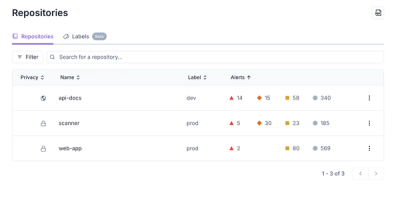
Product
Redesigned Repositories Page: A Faster Way to Prioritize Security Risk
Our redesigned Repositories page adds alert severity, filtering, and tabs for faster triage and clearer insights across all your projects.
@sagold/json-pointer
Advanced tools

This is a json-pointer implementation following RFC 6901.
As the error handling is not further specified, this implementation will return undefined for any invalid
pointer/missing data, making it very convenient to check uncertain data, i.e.
install
yarn add @sagold/json-pointer
usage
import pointer from '@sagold/json-pointer';
const data = {};
if (pointer.get(data, '/path/to/nested/item') !== undefined) {
// value is set, do something
}
// instead of
if (data.path && data.path.to && data.path.to.nested && data.path.to.nested.item) {
// value is set, do something
}
v5, package has been renamed to json-pointer and published under @sagold/json-pointerv4, pointer.delete has been renamed to remove| method | description |
|---|---|
| get(data, pointer) -> value | returns the value at given pointer |
| set(data, pointer, value) -> data | sets the value at the given path |
| remove(data, pointer) -> data | removes a property from data |
| join(...pointers) -> pointer | joins multiple pointers to a single one |
| split(pointer) -> [array] | returns a json-pointer as an array |
| splitLast(pointer) -> [pointer, property] | returns parent-pointer and last property |
The methods
get,set,removeandjoinalso accept a list of properties as pointer. Using join with a list of properties, its signature changes tojoin(properties:string[], isURI=false) -> string
get(data:object|array, pointer:string|array, defaultValue:any) -> value:any
returns nested values
import pointer from '@sagold/json-pointer';
const data = {
parent: {
child: {
title: 'title of child'
}
}
}
const titleOfChild = pointer.get(data, '/parent/child/title'); // output: 'title of child'
console.log(pointer.get(data, '/parent/missing/path')); // output: undefined
and may optionally return a default value with
import pointer from '@sagold/json-pointer';
const value = pointer.get({}, "/invalid/value", 42);
console.log(value); // output: 42
get also accepts a list of properties as pointer (e.g. split-result)
const titleOfChild = pointer.get(data, ['parent', 'child', 'title']); // output: 'title of child'
console.log(pointer.get(data, ['parent', 'missing', 'path'])); // output: undefined
set(data:object|array, pointer:string|array, value:any) -> data:object|array
changes a nested value
import pointer from '@sagold/json-pointer';
var data = {
parent: {
children: [
{
title: 'title of child'
}
]
}
};
pointer.set(data, '/parent/children/1', { title: 'second child' });
console.log(data.parent.children.length); // output: 2
and may be used to build data
import pointer from '@sagold/json-pointer';
const data = pointer.set({}, '/list/[]/value', 42);
console.log(data); // output: { list: [ { value: 42 } ] }
set also accepts a list of properties as pointer (e.g. split-result)
import pointer from '@sagold/json-pointer';
const data = pointer.set({}, ['list', '[]', 'value'], 42);
console.log(data); // output: { list: [ { value: 42 } ] }
remove(data:object|array, pointer:string|array) -> data:object|array
deletes a nested property or item
import pointer from '@sagold/json-pointer';
const data = pointer.remove({ parent: { arrayOrObject: [ 0, 1 ] }}, '/parent/arrayOrObject/1');
console.log(data.parent.arrayOrObject); // output: [0]
remove also accepts a list of properties as pointer (e.g. split-result)
import pointer from '@sagold/json-pointer';
const data = pointer.remove({ parent: { arrayOrObject: [ 0, 1 ] }}, ['parent', 'arrayOrObject', '1']);
console.log(data.parent.arrayOrObject); // output: [0]
split(pointer:string) -> properties:array
returns a json-pointer as a list of (escaped) properties
import pointer from '@sagold/json-pointer';
const list = pointer.split('/parent/arrayOrObject/1');
console.log(list); // output: ['parent', 'arrayOrObject', '1']
In order to resolve a list of properties, you can directly pass the list to get, set or remove
import pointer from '@sagold/json-pointer';
const data = { a: { b: true } };
const list = pointer.split('/a/b');
console.log(pointer.get(data, list)); // output: true
splitLast(pointer:string) -> [pointer, property]
separates json-pointers last property and returns both values as [parent-pointer, property]
import pointer from '@sagold/json-pointer';
const [parent, property] = pointer.splitLast('/parent/arrayOrObject/1');
console.log(parent); // output: '/parent/arrayOrObject'
console.log(property); // output: '1'
join(...pointers:string[]) -> pointer:string
joins all arguments to a valid json pointer
import pointer from '@sagold/json-pointer';
const key = 'my key';
console.log(pointer.join('root', key, '/to/target')); // output: '/root/my key/to/target'
and joins relative pointers as expected
import pointer from '@sagold/json-pointer';
console.log(pointer.join('/path/to/value', '../object')); // output: '/path/to/object'
in order to join an array received from split, you can use join(properties:string[], isURI=false) -> string to
retrieve a valid pointer
import pointer from '@sagold/json-pointer';
const list = pointer.split('/my/path/to/child');
list.pop();
console.log(pointer.join(list)); // output: '/my/path/to'
To join an array of pointers, you must use it with join(...pointers) or all pointers will be treated as properties:
import pointer from '@sagold/json-pointer';
const path = pointer.join(...['/path/to/value', '../object']);
console.log(path); // output: '/path/to/object'
// passing the array directly, will treat each entry as a property, which will be escaped and resolves to:
pointer.join(['/path/to/value', '../object']); // output: '/~1path~1to~1value/..~1object'
All methods support a leading uri fragment identifier (#), which will ensure that property-values are uri decoded
when resolving the path within data. This also ensures that any pointer is returned uri encoded with a leading #. e.g.
import pointer from '@sagold/json-pointer';
// get
const value = pointer.get({ 'my value': true }, '#/my%20value');
console.log(value); // output: true
// join
const pointer = pointer.join('#/my value/to%20parent', '../to~1child');
console.log(pointer); // output: '#/my%20value/to~1child'
// join an array of properties
const uriPointer = pointer.join(['my value', 'to~1child'], isURI = true);
console.log(uriPointer); // output: '#/my%20value/to~1child'
Additionally join(...pointers, isURI) may be used to enforce the pointer type, which is helpful in sanitizing inputs
const uriPointer = pointer.join('my pointer', 'to', 'property', isURI = true);
console.log(uriPointer); // output: '#/my%20pointer/to/property'
const uriSimple = pointer.join('/my pointer/to/property', isURI = true);
console.log(uriSimple); // output: '#/my%20pointer/to/property'
const pointer = pointer.join('#/my pointer', 'to', 'property', isURI = false);
console.log(pointer); // output: '/my pointer/to/property'
FAQs
json pointer - failsafe data retrieval from js and json objects
The npm package @sagold/json-pointer receives a total of 107,401 weekly downloads. As such, @sagold/json-pointer popularity was classified as popular.
We found that @sagold/json-pointer demonstrated a healthy version release cadence and project activity because the last version was released less than a year ago. It has 0 open source maintainers collaborating on the project.
Did you know?

Socket for GitHub automatically highlights issues in each pull request and monitors the health of all your open source dependencies. Discover the contents of your packages and block harmful activity before you install or update your dependencies.

Product
Our redesigned Repositories page adds alert severity, filtering, and tabs for faster triage and clearer insights across all your projects.

Security News
Slopsquatting is a new supply chain threat where AI-assisted code generators recommend hallucinated packages that attackers register and weaponize.

Security News
Multiple deserialization flaws in PyTorch Lightning could allow remote code execution when loading untrusted model files, affecting versions up to 2.4.0.